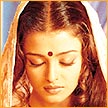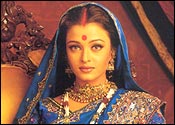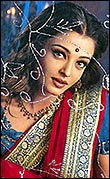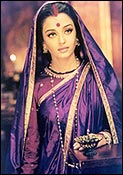
|
Rediscovering Ash
In Sanjay Leela Bhansali's Paro, the actress finds herself
|
1994 was a vintage year for Indian beauty Sushmita Sen took the Miss Universe crown, and Aishwarya Rai the Miss World.
Eight years later, they 'still' introduce her as "the most beautiful woman in the world". And Ash Rai 'still' sweeps into a room in such regal style that you almost see the Miss World tiara still perched on her head.
Being beautiful, you reckon when you watch her walk into a room --- specifically, the conference room of the Hotel Mark, East 77th and Madison, NYC --- is a state of mind.
The eight intervening years of hard-driving life have taken away much of that youthful bloom. Then, her smile sprang unbidden, unconscious, from some deep wellspring of zest --- today, it has the sheen of much practice.
Then, she was open, uninhibited, ready for fun. One early morning in late 1993, she sat in the living room of her Mumbai home and regaled us with wicked out-takes of her colleagues in the modeling world --- brilliant imitations that mocked a world she was very much a part of.
Today, she is cool and composed --- and, most importantly, correct. She probably still mocks the world she is part of now --- but that would be in private, for a very small circle of very trusted friends. In public, her responses are very politically correct --- she knows the buttons to hit, she hits them with practiced ease, and moves on.
One thing has not changed, though, now as then, she rattles on. Ask a question, and she invariably has a lot to say in response. "Ooops, I talk a lot", she giggles when, during our interview, a member of the Eros International [the company that owns international rights to the film, and was hosting the promo event] staff interrupted, twice, to tell us that time was running out.
In New York to promote
Devdas, co-starring Shah Rukh Khan and Madhuri Dixit, and helmed by Sanjay Leela Bhansali, Ash Rai spoke, at length, to Prem Panicker on public life as a beauty queen-turned-Bollywood star lives it.
Excerpts:
Devdas is an iconic story of 1917 vintage, it is also the subject of two acclaimed earlier films. How much did the book, and the earlier film versions, help you in preparing for your role of Paro?
I need to confess that I had not seen the earlier films, nor read the book. I knew in brief what the Devdas story was all about after all, Devdas is for us Indians a synonym for a heartbroken lover, like Romeo would be for the English speaking peoples.
But that is as far as it goes.
It was when Sanjay (Leela Bhansali) narrated the script to me almost two years ago, that I really heard the story for the first time. I then made a conscious effort not to see the earlier films --- I wanted to go in to this project with no mental frame of reference whatsoever, I wanted my Paro to be Sanjay's interpretation of the character and to do that, I needed to stay free of any conceptions based on what previous actresses had done with the role.
After the film was about 80 per cent complete, and when we were heading into the climactic portions, Sanjay would occasionally have someone read out to me relevant bits from the book, to help me get into Paro's head ahead of the intense sequences, and that helped a lot.
But the story itself is somewhat anachronistic, is it not? How is the story of a man who drinks himself to death for a lost love supposed to resonate with Gen X? How could such a story have legs at the box office? Didn't this thought weigh with you when you were offered the role?
 Those are not, frankly, the first thoughts I had when I was offered the role. I am still a relative newcomer to films, when compared with the legendary Shah Rukh Khan, and with a bonafide superstar like Madhuri Dixit --- so the fact that this was an opportunity to work with them on a big scale was one of the immediate attractions.
Those are not, frankly, the first thoughts I had when I was offered the role. I am still a relative newcomer to films, when compared with the legendary Shah Rukh Khan, and with a bonafide superstar like Madhuri Dixit --- so the fact that this was an opportunity to work with them on a big scale was one of the immediate attractions.
Then there is the film itself; it is a classic. Yes, it has been made before but think of that role. How many times does an actress get an offer like that? It is the kind of role you don't want to let go of, if you are lucky enough to be offered it.
When considering a role, I look at it this way: the role has to be inspiring, the co-stars have to be inspiring, the director has to inspire with his enthusiasm, with his belief in what he is doing and why he is doing it. In this project, I found all three. You know, no one goes into a film anticipating, at the outset, the box office result because you cannot predict how any film will do, anyway.
You have said in interviews that since you are not a trained actress, you have had to learn your craft from life
*Interrupting* That's right. I have had no formal training so it is not like a director goes 'okay, be sad' and I can turn it on like a tap. I need to reach inside myself, into my own experiences, draw on those and on the emotions they evoked, then translate them into what I am supposed to do in front of the camera at that particular point.
And has life taught you the sadness of lost love, for you to draw upon when playing Paro?
Well, life does teach you what sadness is. I am neither immune, nor an exception. And for the sake of argument, what if life doesn't teach you that 'particular' lesson? That is ultimately what being an actress is all about --- you retain a certain basic innocence, you retain your malleability
Malleability?
Yes. Like, you know, you don't become one of those push-button, practiced performers. You as an actress stay loose, so that the director can when needed mould you into what he needs of you at that particular point.
Devdas has been a long project you have worked on it for, what, a little over a year? And you and Shah Rukh have both said that it was an intense, very emotional, subject, a very emotional project. So at the end of it, what has it done for you? Has it given you, say, a new direction, a yardstick to evaluate future projects?
 Working on the movie --- and yes, it was intense, it was very emotional --- put us in touch with a more intense part of our personalities. Something that was probably buried deep, that we did not need to be in touch with in the day-to-day course of life. Mostly, if you notice, we skim the emotional waves joy, anger, sorrow, whatever. We do not, as a rule, dive deep, experience the intense peaks of these emotions, except very rarely.
Working on the movie --- and yes, it was intense, it was very emotional --- put us in touch with a more intense part of our personalities. Something that was probably buried deep, that we did not need to be in touch with in the day-to-day course of life. Mostly, if you notice, we skim the emotional waves joy, anger, sorrow, whatever. We do not, as a rule, dive deep, experience the intense peaks of these emotions, except very rarely.
What Devdas did was, for a prolonged period of time, put us in touch with that intensity of emotion --- that part of us that is capable of feeling extreme sadness.
As to whether it forms a yardstick for future projects, no, not really. You try to be versatile, you try to avoid doing the same thing over and over again so it is not like you do a Devdas, you love the experience, so you tell yourself okay let's do more of these.
To take you back in time --- shortly before you went to Sun City for the Miss World pageant, when we asked you if you would get into films, you said it was not likely. Shortly after winning the title, though, you signed on for your first film. What changed your mind?
Pre-Miss World, yes, I did tell people that I was not interested in movies. Look, in most cases, what happens is, you win a big beauty title and then you get flooded with offers. In my case, as you know, that was not how it happened. I had offers even before I went for the Miss World pageant, and these were big offers, from very big names.
At that point, I had decided not to bite the bait. I come from an ordinary, middle class family --- none of us had ever been into acting and stuff, even modeling, when I first started doing it, was new for us. Modeling was okay, I was doing it part time, and I was studying architecture. And I was serious about that.
But then I got back after winning the title, and there was this huge felicitation in my college, and that is when it hit me that I could never be an ordinary student again. Sure there was some buzz when I started modeling, but not like this --- the title changed everything. At that point, I realized I had two choices --- either pack my bags and go abroad to study, so that I would be away from the adulation and could be a normal student, or make an alternate career choice.
That was when Mani Rathnam made me an offer and that opened up the alternate career choice.
But you had, by your own admission, big offers from big names. So what made Mani Rathnam's offer the decider?
 Well, Mani was and is very very big. One of the best directors in India, perhaps the best. comparable to the best worldwide. But that was only half the attraction.
Well, Mani was and is very very big. One of the best directors in India, perhaps the best. comparable to the best worldwide. But that was only half the attraction.
When I decided that I was going to give movies a try, I wanted to break the norms, I wanted to break the myths, the expectations. The offers I got till then were about me, around me I was this beauty queen and the films offered highlighted me, put me in the forefront. It's like 'oh, she won a Miss World so they are making a movie with her'.
But Mani's film, Iruvar, was not about me --- it was not about Aishwarya Rai. Mohanlal is the central character, there were other very talented actors and actresses, there was a very talented crew and then there was Mani himself. I was only a small part of the project and that is why I consciously chose that role, rather than one that revolved around me.
Your opening scene in Iruvar is this dance you do lovely music, great costumes and choreography, yes, but a very delicate, very graceful, totally feminine kind of dance. Bollywood seems to have picked up on that since Iruvar, that is what Hindi movies have had you doing all the time, the sweet, feminine, ethereal stuff
I don't think it is fair to say they made me do that kind of stuff all the time, actually. The funny thing is, I have had formal classical dance training but not for the movies, I learnt dance from when I was a kid, with no thought of movies in mind.
So after Iruvar, I did get known as an actress who can dance. Now if you look at others who have such a label --- and I do not want to name any names here --- you will find that in all their films, they have had at least one 'item' number, a set-piece dance sequence.
But look at me I never get those, though there have been times when I wished I did. Mostly, my song-dance sequences go with the story, they are not 'items'.
Taal
But in Taal, that is my role --- of a girl who sings and dances, who performs. And if you want to be technical, I've had the Nimbuda number in Hum Dil De Chuke Sanam. But that is it
But the 'item' dance is so, um, kitsch --- why would you wish you had done some of those?
That is the funny part, you know when it hit me was when I started doing these stage shows (Ash was in fact scheduled to fly out of NYC the same evening June 28 for a stage show in London this weekend). Other actresses had these item numbers they could dance to, and I had none! So even on stage, I end up doing these soulful, what you called 'feminine' numbers, not the fun, boisterous stuff.
Even in Devdas, it is Madhuri who is the danseuse, so she has the set piece dance numbers. My Paro is just a young girl who, like most young girls, dances when she is happy, so my dances in the film are more a young girl kind of thing except the one celebratory number I dance with Madhuri in.
You always sound very definite about what you want to do, what kind of roles you want. And what you do not want. Today, with so many stars opting to set up their own production companies in order to exercise creative control, have you thought of taking that route?
No, not really, I think I have never felt the need for it. I think the industry does take me seriously, and has from the outset. And there are other ways of exercising creative control for instance, if you notice, I do not necessarily have a release every year.
The media puts its own interpretations on that and I cannot stop them *rolling eyes*. But believe me, the real reason is that over time, I have become very very choosy about what I sign for. I am not looking to rack up numbers, I'd rather do one project in two years as long as it is something I really really want to do, then sign something to be sure I have a release every six months or so. And that is, in its own way, creative control.
Talking of refusing projects, why did you turn down Baba?
Oh, you mean the Rajnikanth one, his upcoming project? Look, I have had to let go of some very good offers, some very good films, down the years. With the best will in the world, you cannot sign them all. There is a greedy part of you that thinks let's sign this and work out the dates and stuff somehow, but I have never been like that.
When someone signs you, they expect a certain commitment of time and effort, within a definite time frame, which may not be yours to give. That is the case here --- the bulk dates they wanted, I don't have. So I had to add this to the long list of films I wanted to do, would have liked to do, but can't.
It's been, what, six years since your first film? From Iruvar to Devdas, how have you changed, how have you grown? Are you at your peak?
Remember I told you I am not a trained actress? So for me, it has been a case of having to grow every day, a little bit at a time. Each scene is for me something I am not prepared for, trained for, so I have to learn and when you learn, you grow.
But yes, I've changed. Five years ago, I would sign three, four films at a time, work a rapid pace, almost work myself to a standstill. Now, I tend to pick, to choose.
But then and now, I remain a director's actress --- in that I haven't changed. This might sound ridiculous, but for me the director really is my guru. I learn from him, I listen to him, I try to do what he wants from me. The quality of my work depends on the director --- he has to be able to inspire me, to mould my character, and if he can do that, I deliver. I'd say my strength lies in the depth of my director's conviction
ALSO READ: The Devdas Special
